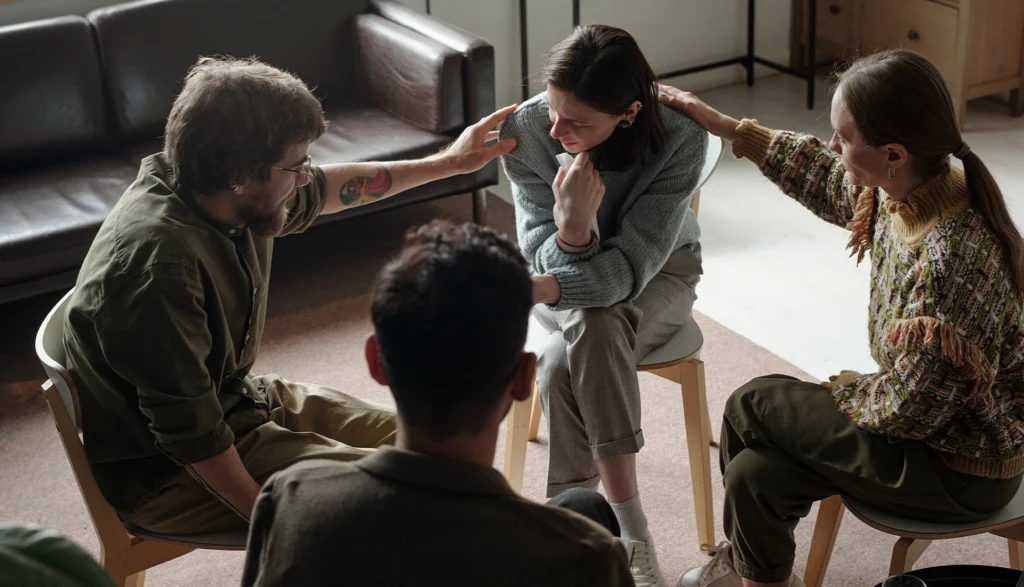Are you considering outpatient treatment and wondering how group therapy can help? The benefits of group therapy in outpatient programs offer numerous advantages. It provides a supportive community, enhances accountability, and helps develop practical coping skills. In this article, we’ll explore these benefits and more, showing why group therapy can be a vital component of your recovery journey.
Key Takeaways
- Group therapy creates a supportive community, helping participants realize they’re not alone in their struggles and fostering deep connections.
- It enhances accountability and motivation by allowing individuals to share goals and celebrate each other’s successes, promoting long-term recovery.
- Group therapy exposes members to diverse perspectives, which broadens understanding and aids personal growth through shared experiences and coping strategies.
Understanding Group Therapy in Outpatient Programs
Group therapy involves a collaborative environment where therapists and individuals with similar struggles come together to foster healing and connection. Key aspects include:
- Group sizes typically range from around 7 to 10 members, allowing for engaging interactions and sharing.
- Sessions are held several times a week, providing consistent support and interaction.
- The structure creates a safe learning space for personal growth and mutual support.
In outpatient settings, group therapy is a cornerstone of addiction recovery and mental health care. It complements other interventions like individual therapy and medication management, offering a holistic approach to treatment.
Intensive outpatient programs (IOPs) often incorporate group therapy as a vital element, providing community, accountability, and a safe space for participants. An intensive outpatient program also helps participants process feelings of shame and guilt without judgment, facilitating emotional healing.
Key Benefits of Group Therapy in Outpatient Treatment
The benefits of group therapy in outpatient treatment are vast and varied. From building a supportive community to developing practical coping skills, group therapy sessions offer a powerful tool for recovery and transformation.
In the following sections, we’ll delve into the specific benefits that make group therapy an effective treatment option for many individuals.
Building a Supportive Community
One of the most significant benefits of group therapy is the sense of community it fosters. In a supportive environment, participants can share their experiences and realize they are not alone in their struggles. This mutual support helps diminish feelings of loneliness and isolation, which are common among those dealing with mental health challenges.
Group therapy provides a safe space where individuals can offer support and encouragement to one another. Sharing personal experiences leads to realizations that one is not alone in their struggles, and this shared vulnerability fosters deep connections among group members. Establishing clear group norms and rules promotes group cohesion, ensuring that everyone feels safe and supported.
At Back Bay Mental Health, we incorporate group therapy into our outpatient programs to create a community that motivates and supports each participant. This supportive community is crucial for personal growth and recovery, as it provides a network of individuals who understand and empathize with each other’s experiences.
Enhancing Accountability and Motivation
Accountability and motivation are key components of successful recovery, and group therapy excels in promoting both. When participants share their goals publicly within the group, it strengthens accountability through mutual support. This public declaration creates a healthy pressure that encourages individuals to stay on track with their recovery goals.
Peer inspiration plays a significant role in maintaining motivation. Seeing others make positive changes and achieve their goals can inspire group members to stay committed to their own recovery journey. This collective motivation is a powerful tool for sustaining long-term recovery and personal growth.
The supportive environment of group therapy allows participants to gain insight into their behaviors and develop strategies for overcoming challenges. Group members provide support by supporting and celebrating each other’s successes, cultivating a positive and motivating atmosphere that fosters personal growth and recovery, creating a strong support system.
Learning from Diverse Perspectives
One of the unique benefits of group therapy is the exposure to diverse perspectives. Group members come from different backgrounds and life experiences, which can lead to the discovery of effective coping mechanisms that one might not have considered. This diversity enriches the recovery journey and aids personal growth by providing new perspectives on common challenges.
Research indicates that group therapy helps group members navigate conflict in a supportive environment, fostering personal growth and resilience. By listening to different viewpoints, a group member can develop a broader understanding of their issues and gain insight into various ways to address them.
Diverse insights from other group members enhance individual coping strategies and enrich the overall therapeutic process. This shared experience aids personal growth and helps participants develop self awareness as they navigate the outside world more effectively.
Developing Practical Coping Skills
Group therapy sessions provide a platform for participants to share their experiences and enhance their coping skills through peer support. Listening to the stories and experiences of others allows participants to learn new coping strategies and cautionary tales about relapse. This collective wisdom is invaluable for managing stress and daily life challenges.
Tailored strategies for handling specific life circumstances and stressors are often discussed in group therapy sessions. These practical techniques help individuals address their unique situations and develop effective coping mechanisms for everyday life, especially when facing similar challenges.
Group therapy provides mental health support and practical skills, helping participants reduce feelings of stress and anxiety. This enhances their ability to navigate life’s challenges and maintain their recovery.

Types of Group Therapy in Outpatient Programs
Outpatient programs offer various types of group therapy to meet diverse recovery program needs. These include process groups, skill-building sessions, and psychoeducation groups, each designed to address specific aspects of recovery and personal growth.
The following sections will explore different stages of group therapy and their unique benefits.
Process Groups for Emotional Recovery
Process groups mainly emphasize the emotional dimensions of recovery. They target feelings and experiences to aid in the healing journey. These groups are typically unstructured, allowing for spontaneous sharing and discussions. The role of the group therapist in process groups is to facilitate deeper conversations and encourage vulnerability among participants.
Participants in process groups navigate their emotions in a safe and supportive environment. This therapeutic process helps them develop coping strategies and gain insight into their emotional struggles. The group setting fosters a sense of community and group cohesion, which is crucial for emotional healing and recovery.
At Back Bay Mental Health, we incorporate process groups into our outpatient programs to support participants in their emotional recovery journey. These groups provide a safe space for emotional expression, helping individuals reduce feelings of shame and guilt while promoting mental health support.
Skill-Building Groups for Real-Life Application
Skill-building groups focus on practical tools for addiction recovery, including stress management, communication, and relapse prevention related to substance use disorders. These sessions emphasize practical techniques that help participants manage life’s challenges effectively.
Participants in skill-building groups learn practical skills that can be applied in everyday life. These include developing social skills, coping mechanisms, and strategies for managing stress. The group setting provides a supportive environment where participants can practice these skills and receive feedback from their peers.
At Back Bay Mental Health, our skill-building groups are designed to help participants navigate real-life challenges and maintain their recovery. These groups empower individuals by providing practical tools and techniques to manage their mental health and achieve personal growth.
Psychoeducation Groups for Knowledge Empowerment
Psychoeducation groups aim to increase understanding of mental health issues and recovery processes. These groups provide valuable information that helps participants make informed decisions about their treatment.
Participants in psychoeducation groups learn about the nature of their mental health conditions, treatment options, and coping strategies along the patient’s journey. This knowledge empowers them to take an active role in their recovery and develop effective coping mechanisms for managing their symptoms.
Structured psychoeducational groups can provide significant learning and support benefits, even when developing group cohesion online presents challenges. At Back Bay Mental Health, we offer psychoeducation groups to help individuals understand their mental health conditions and navigate their recovery journey.
The Role of the Group Therapist
The group therapist plays a crucial role in facilitating group therapy sessions. As a facilitator, the group therapist:
- Ensures smooth interactions
- Guides the group process effectively
- Promotes positive interactions
- Encourages openness
- Prevents conflicts among group members.
A safe environment is essential in group therapy. The group therapist:
- Protects members from hostility
- Encourages respectful dialogue
- Sets limits that define acceptable behaviors within the group
- Blocks disruptive behaviors to maintain a constructive group dynamic
Managing conflicts within group therapy can be an opportunity for learning. The group therapist addresses individual and group goals, ensuring alignment and clarity from the outset, while the group leader facilitates the process, fostering a strong therapeutic alliance.
In online group therapy, facilitators may need to implement specific strategies to foster connections and group norms, compensating for the absence of physical presence.
How Group Therapy Complements Individual Therapy
Group therapy can be as effective as individual therapy, addressing various mental health conditions while being more resource-efficient. Both online and in-person group therapy can yield effective outcomes, though the dynamics of each setting may differ.
Combining group therapy with individual therapy enhances recovery outcomes by providing diverse support and insights. At Back Bay Mental Health, we utilize both approaches to offer a comprehensive treatment plan for our clients. This combination allows for a more holistic approach to mental health care, addressing the unique needs of each individual.
By participating in both group and individual therapy sessions, individuals can benefit from the strengths of each modality. Group therapy provides a sense of community and shared experience, while an individual therapist offers personalized attention and tailored treatment plans.
Online Group Therapy: A Flexible Option
Online group therapy sessions offer a flexible and convenient option for mental health support. They can significantly improve attendance rates compared to in-person groups, making it easier for participants with busy lives to engage. Online group therapy’s convenience allows individuals facing barriers to traditional face-to-face sessions to receive the support they need.
Technology features like breakout rooms can enhance interaction among group members, helping to create a sense of community in virtual settings. Despite the lack of physical presence, online group therapy can still provide a supportive and engaging environment for participants.
Online group therapy also enhances access to mental health care by being a cost-effective treatment option. At Back Bay Mental Health, we offer online group therapy to provide flexible and accessible mental health support for our clients.
Special Considerations for Different Mental Health Conditions
Different forms of group therapy cater to specific mental health challenges and recovery needs. Outpatient therapy formats are designed to address individual differences and provide tailored support for various conditions. At Back Bay Mental Health, we connect individuals to therapy groups that are best suited to their specific mental health conditions.
Group therapy provides emotional support and helps individuals with anxiety disorders learn coping strategies from their peers. For those with bipolar disorder, group therapy can assist in managing symptoms by fostering understanding and shared experiences among participants. Eating disorders recovery groups often focus on body image issues and promote healthy coping mechanisms through group discussions.
Group therapy addresses the unique needs of different mental health conditions, providing a comprehensive approach to mental health care. This tailored support helps individuals navigate their recovery journey and achieve personal growth through group treatment, highlighting the importance of group psychology. Group therapy matters.
Group Therapy at Back Bay Mental Health
Back Bay Mental Health is a therapy and mental health facility located in Boston, Massachusetts. We offer services to help individuals who struggle with mental health issues through therapy and medication management. Our outpatient programs incorporate group therapy to provide an inclusive environment for individuals seeking support.
We maintain small group sizes, usually around 15 participants, to facilitate deeper connections and more personal interactions among members. Our therapy setting groups are structured to ensure productive discussions, guided by a trained therapist to maintain a positive atmosphere for a few seconds.
At Back Bay Mental Health, we strive to create a supportive community where participants can share their experiences and navigate their recovery journey together. Our group therapy sessions are designed to provide the mental health support and practical skills needed for successful recovery.
Group therapy in outpatient treatment offers a myriad of benefits, from fostering a supportive community to providing practical coping skills. By participating in group therapy sessions, individuals can experience enhanced accountability, motivation, and personal growth through shared experiences and diverse perspectives. Different types of group therapy, including process groups, skill-building groups, and psychoeducation groups, cater to various aspects of recovery and personal development.
At Back Bay Mental Health, we integrate group therapy into our outpatient programs to create an inclusive and supportive environment for all participants. Our structured approach, combined with the expertise of our group therapists, ensures that each session is productive and beneficial. Whether you choose in-person or online group therapy, the journey towards mental health recovery is enriched by the collective support and shared wisdom of group members. Embrace the power of group therapy and take the next step towards a healthier, more fulfilling life.
Frequently Asked Questions
What is group therapy, and how does it work in outpatient programs?
Group therapy is a supportive setting where people facing similar challenges can come together to share and heal, guided by a therapist. In outpatient programs, it promotes personal growth and connection while offering a safe space for consistent support.
How does group therapy enhance accountability and motivation?
Group therapy boosts accountability by having participants openly share their goals, which fosters a supportive environment. Plus, witnessing peers succeed can really inspire you to stay motivated on your own journey.
What types of group therapy are available in outpatient programs?
Outpatient programs typically feature process groups for emotional healing, skill-building groups for learning practical tools, and psychoeducation groups for gaining valuable knowledge. Each type serves a unique purpose to support your recovery journey.
How does online group therapy compare to in-person sessions?
Online group therapy is often more convenient and cost-effective than in-person sessions, allowing you to attend from anywhere and improving attendance rates. Plus, features like breakout rooms can enhance interaction and foster a sense of community.
How does group therapy complement individual therapy?
Group therapy complements individual therapy by offering a supportive community and diverse perspectives that enrich your healing process. Together, they create a more comprehensive approach to your mental health journey.




